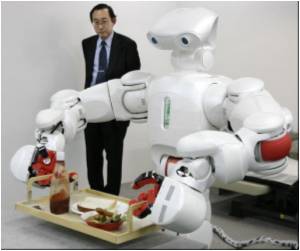People expressed more positive feelings toward a robot that would take care of them than toward the ones that needed care, finds researchers.

"How the robot is presented to users can send important signals to users about its helpfulness and intelligence, which can have consequences for how it is received by end users," he said.
To determine how human perception of a robot changed based on its role, researchers observed 60 interactions between college students and Nao, a social robot developed by Aldebaran Robotics, a French company specializing in humanoid robots.
"When (humans) perceive greater benefit from the robot, they are more satisfied in their relationship with it, and even trust it more," Sundar said.
"In addition, we found that when the robot cares for you, it seems to have greater social presence," he said.
A robot with a strong social presence behaves and interacts like an authentic human, according to Ki Joon Kim, doctoral candidate in the department of interaction science, Sungkyunkwan University, Korea, and lead author of the journal article.
Advertisement
Participants were also more likely to attribute human qualities to the caregiving robot.
Advertisement










